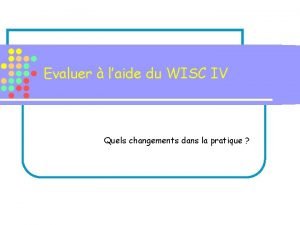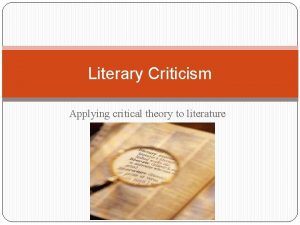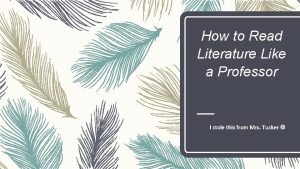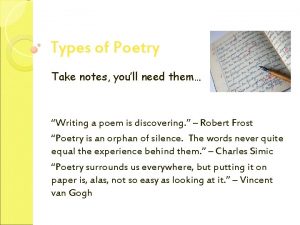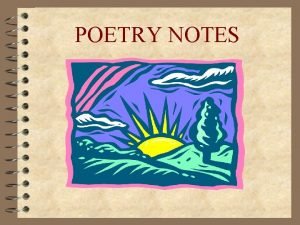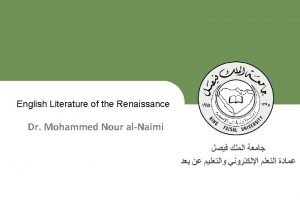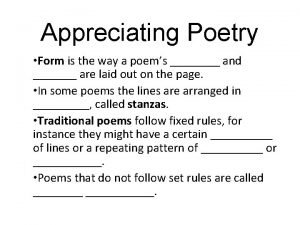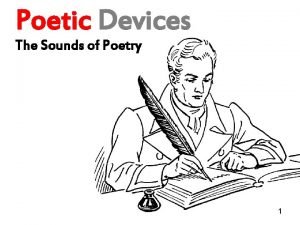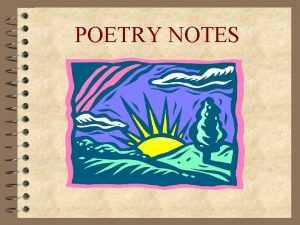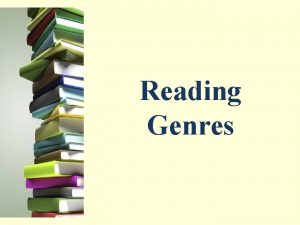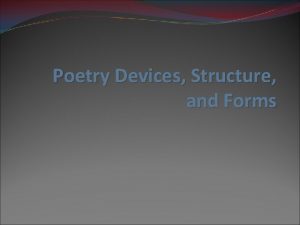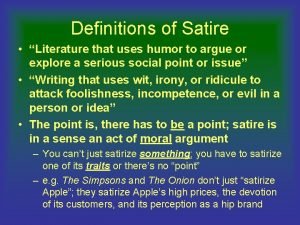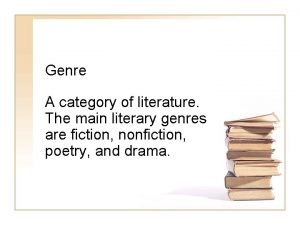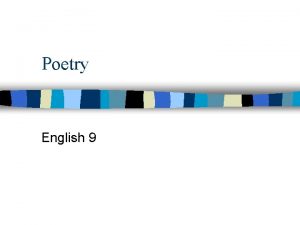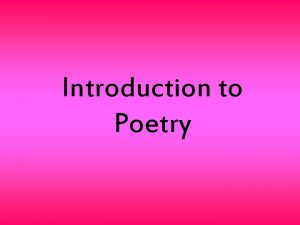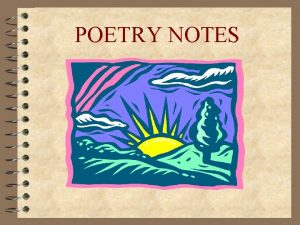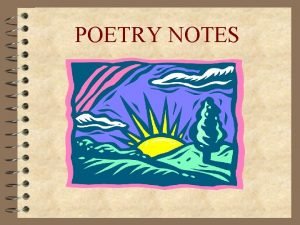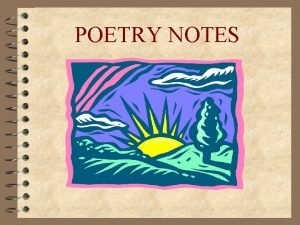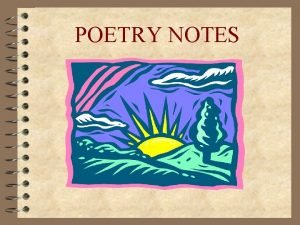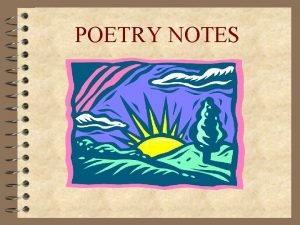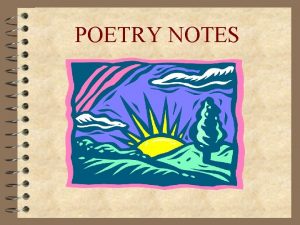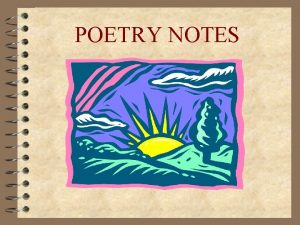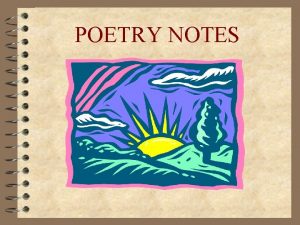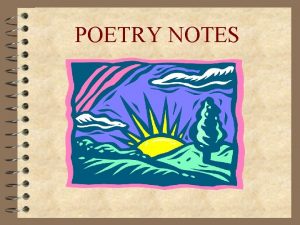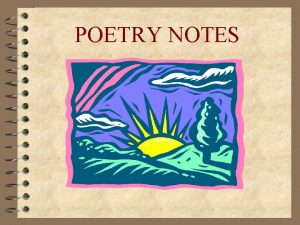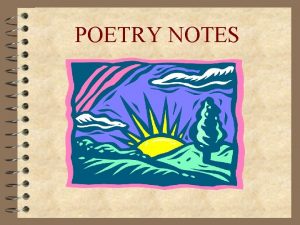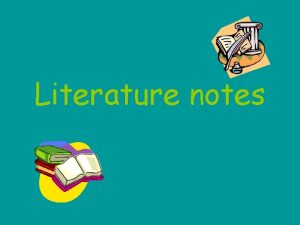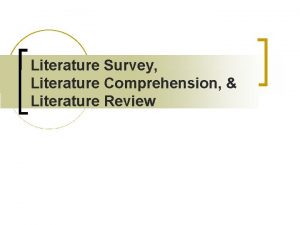POETRY NOTES POETRY is a type of literature

















- Slides: 17

POETRY NOTES

POETRY is… a type of literature that expresses ideas and feelings, or tells a story in a specific form (usually using lines and stanzas)

POETIC FORM 4 LINE - a group of words together on one line of the poem 4 STANZA - a group of lines arranged together A word is dead When it is said, Some say. I say it just Begins to live That day. - Emily Dickinson

POETIC FORM Stanza 1 1 A word is dead 2 When it is said, 3 Some say. Stanza 2 4 I say it just 5 Begins to live 6 That day. - Emily Dickinson

POET VS. SPEAKER POET the author of the poem, the person who actually wrote it VS SPEAKER the “narrator” of the poem, the voice telling us the thoughts/feelings/story

POETIC SOUND EFFECTS

RHYMES Words sound alike because they share the same ending sounds. LAMP STAMP

RHYME SCHEME 4 a pattern of rhyming words or sounds (usually at the end of the lines). 4 Use the letters of the alphabet to represent sounds to be able to visually “see” the pattern. (See next slide for an example. )

SAMPLE RHYME SCHEME A mighty creature is the germ, Though smaller than the pachyderm. His customary dwelling place Is deep within the human race. His childish pride he often pleases By giving people strange diseases. Do you, my poppet, feel infirm? You probably contain a germ. -“The Germ” by Ogden Nash A A B B C C A A

PRACTICE RHYME SCHEME 1 A word is dead A 2 When it is said, A 3 Some say. B 4 I say it just C 5 Begins to live D 6 That day. B - Emily Dickinson

FIGURATIVE LANGUAGE

ALLITERATION 4 Sounds repeated at the beginnings of words If Peter Piper picked a peck of pickled peppers, how many pickled peppers did Peter Piper pick?

SIMILE 4 Comparison of two unlike things using “like” or “as” Friends are like chocolate cake, you can never have too many. Chocolate cake is like heaven always amazing you with each taste or feeling. Chocolate cake is like life with so many different pieces. Chocolate cake is like happiness, you can never get enough of it. - “Chocolate Cake” by Anonymous

METAPHOR 4 Comparison of two unlike things NOT using “like” or “as” A spider is a black dark midnight sky. Its web is a Ferris wheel. It has a fat moon body and legs of dangling string. Its eyes are like little match ends. - “Spider” by Anonymous

HYPERBOLE 4 An exaggeration Here once the embattled farmers stood And fired the shot heard round the world -from "The Concord Hymn" by Ralph Waldo Emerson

ONOMATOPOEIA 4 Words that imitate the sound that they are naming Tlot-tlot; tlot-tlot! Had they heard it? The horse-hoofs ringing clear; Tlot-tlot, tlot-tlot, in the distance? Were they deaf that they did not hear? - from “The Highwayman” by Alfred Noyes

PERSONIFICATION 4 A nonliving thing given human of life-like qualities Hey diddle, Diddle, The cat and the fiddle, The cow jumped over the moon; The little dog laughed To see such sport, And the dish ran away with the spoon. -from “The Cat & the Fiddle” by Mother Goose
 Cube wisc
Cube wisc Victorian age introduction
Victorian age introduction Theory of literature notes
Theory of literature notes Medieval poetry in english literature
Medieval poetry in english literature How to read literature like a professor chapter 18
How to read literature like a professor chapter 18 Accrued interest revenue on all notes receivable.
Accrued interest revenue on all notes receivable. Types of poetry notes
Types of poetry notes Poetry notes
Poetry notes Metaphysical poetry notes
Metaphysical poetry notes Appreciating poetry notes
Appreciating poetry notes Poetic devices with examples
Poetic devices with examples The beat created by the sounds of the words in a poem
The beat created by the sounds of the words in a poem Reading genres
Reading genres Types of tones
Types of tones What type of literature uses humor to point
What type of literature uses humor to point A category or type of literature
A category or type of literature What is metered verse
What is metered verse The literature compiled more of poetry as opposed to prose
The literature compiled more of poetry as opposed to prose
